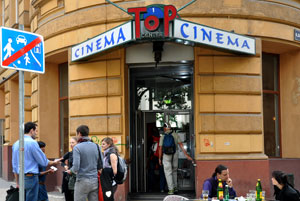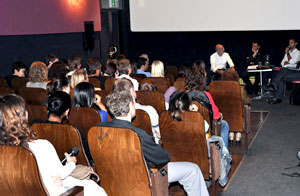

Using the occasion of World Environment Day and World Oceans Day to draw attention to the Rio+20 Conference, the United Nations Information Service (UNIS) Vienna, in cooperation with this human world (THW) Film Festival and Topkino, dedicated this month's Ciné ONU Vienna film screening to the documentary "Plastic Shores" at its usual down town cinema venue, Top Kino, on 11 June 2012.
The documentary deals with the pollution of oceans and coastlines through plastic waste and highlights the dangers of the presence of plastic in the human and animal food chain. Following the chain of plastics within our oceans around the world, the film aims to make people think about our use of disposable plastics and what happens to them after they have been thrown away.
The panel discussion following the film screening featured Werner Raza, Head of the Austrian Research Foundation for International Development (ÖFSE) and NGO-Representative within the Austrian Delegation to Rio+20, Wojciech Rogalski, Head of the Unit for Strategic Planning of the Vienna Municipal Department for Waste Management, as well as Matthias Jurek from the United Nations Environment Programme (UNEP) in Vienna. Moderated by UNIS Director Janos Tisovszky, the discussion circled around the expectations for the upcoming Rio +20 summit and the political, economic, legal and ethical challenges in agreeing on binding agreements on sustainability as well as in enforcement existing international environmental legislation.
While some of the panel members felt that most stakeholders did not expect the Rio +20 summit to produce any milestones, the participants of the discussion - among them high school and university students, NGO representatives, and UN staff members - agreed that awareness about environmental issues had increased over the past 20 years. Questions from the audience further dealt with the protection of the global commons, cap and trade, the responsibility of the industry as well as specific legislation on waste management.
Concluding the event attended by around 100 persons, the panellists as well as the audience agreed that still a lot has to be done and that the best way to start is with oneself through a more responsible attitude to sustainability in one's daily life and also to connect with others and become involved in civil society actions in order to pressure governments to adopt a common approach to sustainability and to trigger practical action. The animated discussion showed that awareness among the audience had certainly been raised.
For further information visit the Ciné-ONU page.